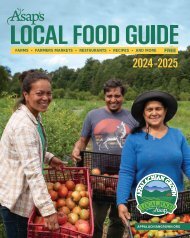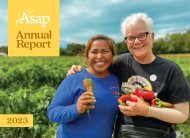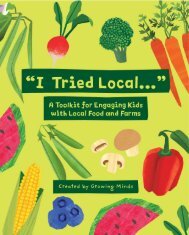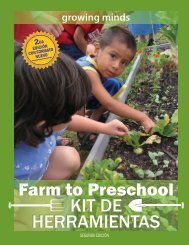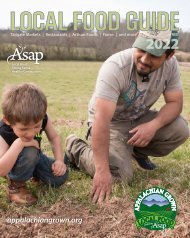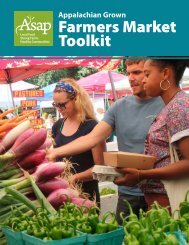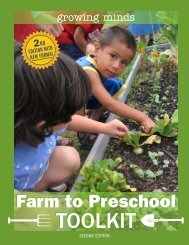2023 Local Food Guide
ASAP’s annual Local Food Guide is the definitive resource for local food in Western North Carolina and the Southern Appalachians. Find hundreds of listings for family farms and farmers markets, as well as restaurants, artisan producers, and groceries that feature local food. Connect with farm experiences, like u-pick, farm stands, lodging, and more.
ASAP’s annual Local Food Guide is the definitive resource for local food in Western North Carolina and the Southern Appalachians. Find hundreds of listings for family farms and farmers markets, as well as restaurants, artisan producers, and groceries that feature local food. Connect with farm experiences, like u-pick, farm stands, lodging, and more.
Create successful ePaper yourself
Turn your PDF publications into a flip-book with our unique Google optimized e-Paper software.
of Carbon Harvest, a regional<br />
carbon offsets platform funding<br />
agroforestry projects.<br />
“The animals struggled in hotter<br />
months on the portions of the<br />
property without trees,” says<br />
Jake. Hauling shade structures<br />
isn’t practical and can result in<br />
over-impacted areas around the<br />
structures. Trees provide natural<br />
shade as well as fodder through a<br />
process known as chop and drop.<br />
“Basically, we cut down portions<br />
of the trees, feed it to the animals,<br />
and it will regrow.” That gives<br />
them an organic feed supplement<br />
the farm can produce on its<br />
own, rather than purchase, and<br />
adds another layer of diversity.<br />
“Those deep-rooted trees will pull<br />
minerals up to the surface that<br />
grass is not able to, and both the<br />
animals and the grass will reap<br />
the benefits.”<br />
Connecting with<br />
Customers<br />
To ensure that no part of the<br />
animal would be wasted, Crow<br />
Fly began with a whole animal<br />
sales model, with minimums of a<br />
half hog, whole lamb, or quarter<br />
beef. Jake pitched his specialty,<br />
high-end product to Asheville<br />
restaurants and developed strong<br />
relationships with Chestnut<br />
and Blackbird. Animal shares<br />
were a way to connect with<br />
neighbors. But after about a<br />
year they realized they wanted<br />
a more accessible product. “We<br />
pigeonholed ourselves a little,”<br />
admits Jake. This winter, Jake<br />
and Luna started selling smaller<br />
meat boxes at farmers markets<br />
in Asheville. They worked with<br />
their processor to create custom<br />
bundles that make use of every<br />
cut. “We still know the whole<br />
animal is being used, but it’s an<br />
approachable amount of meat for<br />
someone to purchase.” Bundles<br />
vary from two to four pounds of<br />
meat to larger sampler sizes.<br />
Farmers markets are also an<br />
important place to tell their story.<br />
“The best way to sell our product<br />
is to talk to literally one person<br />
at a time,” says Jake. “We’re<br />
educating consumers about the<br />
way we manage our farm, why it’s<br />
important, and why it’s different<br />
than what you would typically<br />
see. This is a more labor intensive<br />
and expensive way to raise<br />
animals, but people are buying<br />
into what we’re doing and they<br />
believe in us.”<br />
After a calf is born, it will be three<br />
years before it’s processed. In<br />
that time, Jake will have moved it<br />
around the property five hundred<br />
or more times. He will have<br />
physically set up paddocks for<br />
each of those moves and hauled<br />
water to the animals around<br />
a thousand times. “So much<br />
care and work goes into raising<br />
animals in this system,” he says.<br />
Farm tours are another way to<br />
show that effort. “ASAP’s Farm<br />
Tour [in September 2022] was<br />
amazing for us and introduced<br />
lots of new customers,” says<br />
Jake—though he admits it<br />
strained his voice. “I spend most<br />
of my days not speaking because<br />
I’m around animals,” he laughs.<br />
The farm began offering tours<br />
by appointment this year, giving<br />
people an up-close look at the<br />
animals and a chance to hear<br />
Jake’s passionate explanation of<br />
his farm practices. “Some farms<br />
don’t want customers to see<br />
behind the scenes, but this is<br />
something we want to show off.”<br />
appalachiangrown.org <strong>Local</strong> <strong>Food</strong> <strong>Guide</strong> 43




